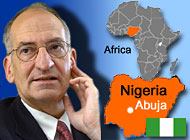Swiss business makes cautious overtures to Nigeria

A Swiss government-led business delegation is in West Africa for a five-day tour of Nigeria and Benin. The Swiss economics minister, Pascal Couchepin, is to join the group on Saturday, ahead of a meeting with the Nigerian president, Olusegun Obasanjo.
Benin, one of Africa’s poorest and smallest nations with only six million inhabitants, has been one of the main beneficiaries of Swiss bilateral aid for years. By contrast, neighbouring Nigeria, which is rich in oil and Africa’s most populous country with 120 million inhabitants, offers vast business potential – at least in theory.
In practice, the picture is less rosy. Frustrated by the mismanagement of the economy by successive military regimes, many Swiss enterprises have sold their Nigerian concerns, which had grown to considerable size during the oil boom of the 1970s.
Nigeria wants to reverse that trend. The country, which was ruled by military juntas for 30 of the 41 years since it gained independence from Britain, has enjoyed a rare two years of civilian government since voters elected Obasanjo, a former general and military ruler, in May 1999.
Today, Swiss foreign direct investment (FDI) in Nigeria stands at SFr30 million ($16.8 million) – a fraction of what Swiss companies have invested in countries such as South Africa (SFr1,2 billion) and Brazil (SFr5 billion).
“Abacha loot”
Expectations are high in Nigeria – especially since Switzerland responded quickly to the new government’s demand in 1999 and froze the Swiss bank accounts of a former dictator, General Sani Abacha, worth SFr1,14 billion.
Some SFr112 million of what Nigerians refer to as “the Abacha loot” has so far been returned to Nigerian government coffers, with the rest pending.
Switzerland’s action was lauded as “exemplary” by the Nigerian government, which is seeking to secure similar guarantees by the United Kingdom and other European nations which have blocked accounts belonging to Abacha and his family and associates.
“Couchepin will be warmly welcomed”, says Enrico Monfrini, a Geneva-based lawyer who represents Nigerian government interests in Europe. “Every taxi driver now knows Switzerland as the country that means well with Nigeria.”
Unlike direct investment, Swiss trade with Nigeria has seen something of an upswing, especially since the resumption of civilian rule. Imports from Nigeria almost doubled within a year to reach SFr600 million in 2000, although exports remained more or less constant at around SFr90 million.
However, 99.9 per cent of imports consist of crude oil, Nigeria’s main foreign exchange earner. Nigeria currently is Switzerland’s second most important supplier of oil.
Repatriation of profits
Switzerland’s most visible commercial presence in Nigeria is Nestlé, a producer of food and dairy products. The company expanded its investments after the Obasanjo government scrapped a decree limiting the repatriation of profits.
Most of the 50 Swiss enterprises which have investments in Nigeria are engaged in the chemical, electrical and construction sectors, and provide employment for roughly 6,000 workers.
Typically, they hold government contracts for infrastructure services, but are not involved in “big projects”, according to Swiss Business Federation spokesman, Heinz Pletscher.
Switzerland and Nigeria signed a bilateral investment agreement in November 2000, but informal investment barriers remain an obstacle to greater cooperation. Nestlé’s efforts to sustain its engagement illustrate the difficulties western investors face in Nigeria.
“Nestlé had to build its own capacity, and to educate its workforce in order to be able to rely on them,” says Hanspeter Strauch, Switzerland’s ambassador to Nigeria until early this year. “That’s a situation many less experienced and smaller firms would understandably shy away from.”
Only two small- and medium-sized enterprises are sending representatives with the Swiss delegation to West Africa, according to the Swiss Business Federation. It adds that firms engaged in tourism and food processing – sectors Nigeria is particularly keen to develop – are not represented at all.
Another difficulty facing new investors is “that you cannot go it alone”, says Strauch. A string of well-publicised scandals and Nigeria’s seemingly unassailable position at the top of an annual corruption table, published by Transparency International, a non-governmental organisation, have made Swiss business less than enthusiastic to seek out local business partners.
“Good, reliable partners exist, but it’s not easy to find them”, says Strauch. He thinks the Nigerian-Swiss chamber of commerce that is to be opened this week in Lagos, Nigeria’s commercial capital, in the presence of Couchepin, will facilitate the necessary contacts in future.
“In the two years since Obasanjo came to power Nigeria has acquired the legal instruments to combat corruption”, Strauch says. “Whether they are going to be used remains to be seen.”
by Markus Haefliger

In compliance with the JTI standards
More: SWI swissinfo.ch certified by the Journalism Trust Initiative
You can find an overview of ongoing debates with our journalists here. Please join us!
If you want to start a conversation about a topic raised in this article or want to report factual errors, email us at english@swissinfo.ch.